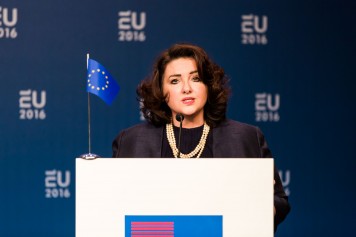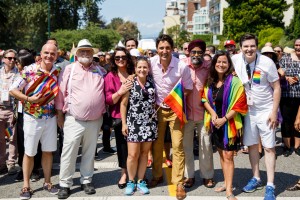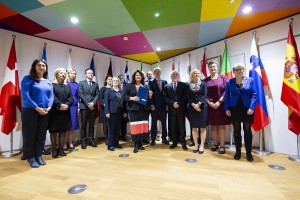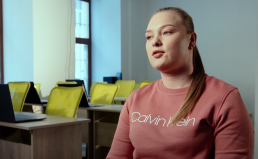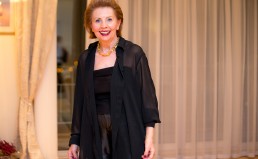Since 2013, Malta has dramatically transformed its image with regards to implementation of LGBTI rights. Civil Union and Cohabitation bills, as well as a law establishing basic rights for transgender and intersex people, have been passed. The latter was the first-ever law implemented by any country to protect the rights of intersex people. Malta was also the first country in the world to ban “homosexual conversion therapies”.
The work of LGBTI activists and human rights defenders is never done – and Malta is a perfect example. In July 2018, the Maltese Parliament overwhelmingly voted to legalise same-sex marriage.
Through her extensive support for LGBTI rights, the Maltese Minister for European Affairs and Equality Helena Dalli reminded policymakers that politicians have a role to play in shaping positive public opinion on equality issues. In this interview, the Minister will try to deconstruct the Maltese phenomenon and tell us how Catholic Malta embraced LGBTI rights.
The world has seen the Maltese embrace of LGBTI rights with great admiration. Could you please try to define the reasons behind the Maltese phenomenon? How did you manage to reach the 1st place on the ILGA-Europe Rainbow Map so quickly?
“LGBTI rights are human rights issues and the moment I became Minister for Social Dialogue, Consumer Affairs and Civil Liberties in 2013 I started working towards their affirmation in their entirety. Indeed, I set up an LGBTI Consultative Council consisting of representatives of all LGBTI organisations to formulate legislative and policy proposals. Concurrently, I recruited experts in the field to join my secretariat, and addressed the plight of Joanne Cassar, who was left fighting for her right to marry her partner to the European Court of Human Rights because of her trans past.
Since then, Government’s partnership with civil society has paid back as we introduced one law after another to eradicate legal discrimination against LGBTI persons and their loved ones. We also adopted an LGBTI action plan with clear goals, and last year set up the Sexual Orientation, Gender Identity, Gender Expression and Sex Characteristics (SOGIGESC) Unit within the Human Rights and Integration Directorate.
In all this process, I had the full support of the Prime Minister who led the way in affirming publicly the need to respect all persons equally regardless of their personal characteristics.”
Like in Lithuania, the Catholic Church plays an important role in Malta. Which arguments could be used in trying to establish a dialogue with conservative part of society in trying to ensure LGBTI human rights?
“LGBTI equality was expressly a part of Government’s electoral manifesto and the electorate awarded us strong majorities in both the 2013 and 2017 elections. In my dialogue with the Bishops and the Church in general I always refer back to basic Catholic teachings, such as that we are all created in the image of God, and that we should all love one another as we love ourselves. I always point out that these principles are inclusive of everyone and not solely one group or another. I have to say that the Bishops have over these past years worked in their own way to pass on a message of inclusion. For example, the Archbishop of Malta asked parents to love their children regardless of sexual orientation and gender identity on primetime national TV, while he celebrates mass for Drachma and Drachma Parents Group – both Christian LGBTI organisations – on 17 May, the International Day against Homophobia and Transphobia. The Archbishop also bought books published by the Drachma Parents Group dealing with the parents’ coming to terms with their LGBTI children and distributed them to all the parishes in Malta.”
- Maltese Minister for European Affairs and Equality Helena Dalli
- Maltese Minister for European Affairs and Equality Helena Dalli (third on the left), Minister of Foreign Affairs of Canada Chrystia Freeland (fourth on the left) and Prime Minister of Canada Justin Trudeau (fourth on the right)
- Signing of common paper for continued efforts within the EU to ensure full protection of LGBTI rights
We would like to congratulate the Maltese Government for its leadership in continuous strive for implementation of human rights. Could you please tell us more about your collaboration with the local NGOs in trying to reach the common goals?
“As I have already stated we set up the LGBTI Consultative Council early in 2013 precisely because we wanted to ensure that all steps that we take in this area are the right ones. The Council has drafted Bills, provided policy guidance, invited Government to community events and in general facilitated the process of change. It is not uncommon for members of this Council to write to me directly to invite me to their organisation’s events or to ask me to contribute in one way or another. I strongly believe that this openness on the part of Government and civil society was key to Malta’s transformation.”
The Maltese Government has demonstrated leadership not only on a national, European, but also on an international level. Which best Maltese practices did you present at a global Equal Rights Coalition conference in Vancouver, Canada?
“I was invited to speak about Malta’s experience and the change that we brought about for all persons in the country as a result of our LGBTI equality policy. My contribution centred around basic principles of humanity and compassion. I argued that even if the legislation that we introduced improved the life of only one person, we needed to make the effort to change laws and policies to provide the deserved wellbeing to that person. I argued that equality is not a finite resource, and therefore there does not need to be a queue or a priority list of issues to be addressed first. Instead, we need to ensure that all are well served and put our money where our mouth is. Ultimately, equality pays back and society functions better when it is affirmed.”
Recently the Maltese Government has prepared a common paper, signed by 19 EU member states, calling for continued efforts within the EU to ensure full protection of LGBTI rights. What are the next steps the Maltese Government is willing to take in order to shape European LGBTI politics?
“A similar initiative was taken by the Kingdom of the Netherlands in 2013 and it gave us results as the EU adopted the LGBTI List of Actions. Malta had joined that process and I remember fondly the first IDAHOT Forum organised in The Hague where I signed the Dutch call on behalf of the Maltese Government. This time we took the leadership and worked closely with the other member states to issue a clear call for a follow-up to the List of Actions, ideally more ambitious and far-reaching. Clearly, the formulation and signing of the common paper is only the beginning of the process. We will surely follow-up with the new Commission once it is instated.”
At the moment, Lithuania provides no legal recognition of gender and same-sex relationships. What advice could you give to Lithuanian Government, which is lagging behind when it comes to ensuring LGBTI human rights?
“The Maltese were regarded as conservative the world over. No-one expected us to come out so strongly for equality for same-sex couples and for the recognition of gender in the way that we did. This however hinged on a stereotype. Malta today is still primarily Catholic and all remain free to follow their beliefs. Nonetheless, we have removed the influence of those beliefs from state marriage and processes related to the Public Registry as the fundamental freedoms and rights of all need to be respected. The changes implemented in Malta were always followed by celebration and the population understood that all was being done in the spirit of individual freedoms and supported the changes.”
Recently the Constitutional Court of the Republic of Lithuania announced its judgement that refusal to issue a temporary residence permit to stay in Lithuania to a spouse or partner cannot be based solely on the foreigner’s gender identity and/or sexual orientation. Could you please tell us more about legal recognition of same-sex relationships in Malta? Are there many applicants applying for legal recognition of gender and same-sex relationships in your country?
“Even before Malta introduced civil unions and later marriage equality, we changed our national law to recognise all partnerships and marriages for the purpose of movement to Malta. In 2014, we introduced civil unions that are equivalent to marriages in effect but carry a different name. A legal notice details all foreign partnerships that are recognised as civil unions in Malta, thus facilitating entry and residence in Malta. They were open to all couples regardless of gender and sexuality.
In 2015, we introduced the law regarding the recognition of gender identity based on self-determination and the protection of everyone’s sex characteristics against unwanted interventions. This extended the rights of the 2014 civil unions law as trans persons could have their gender identity affirmed in all documents including their past marriage/civil union certificates and their children’s birth certificates amongst others.
In 2017, we made marriage legislation gender neutral and thus amended all official forms to remove gendered references. This ensures that all persons are treated equally, and that sexual orientation and gender identity issues become secondary concerns as they are not elicited by public officials.
In terms of gender identity recognition there was a steep increase in requests, mainly because several persons could not change their legal gender under the restrictive system that we had before. As for same-sex relationship recognition, the numbers are higher than in some larger EU Member States. Again, this is due to different reasons such as an increasingly out and visible LGBTI community and international marriages organised in Malta.”
Are you interested in participating in bilateral meetings with the representatives of the Lithuanian Government? Which best Maltese practices in fostering LGBTI human rights would you like to share during such meetings?
“Yes, of course. I would highlight the importance of civil society and the need of having a constructive dialogue with it. That in itself is already a milestone. Once that is established, the question is only of ‘when’ rather than ‘if’. I am well aware of the work of LGL over the years and I am sure that you would bring a lot to the table once invited.”
What key message would you like to give to the Lithuanian LGBTI community during your visit in Lithuania?
“You are not alone and don’t give up. The Maltese LGBTI community had a hard time trying to convince the previous government of the need to address the equality agenda, and for several years very little progress was achieved. Nonetheless, the core group of Malta LGBTI Rights Movement kept up the pressure and built expertise at the European level thanks to their involvement in ILGA-Europe amongst others. Today they and the wider LGBTI community in Malta reap the fruit of their resilience.”

